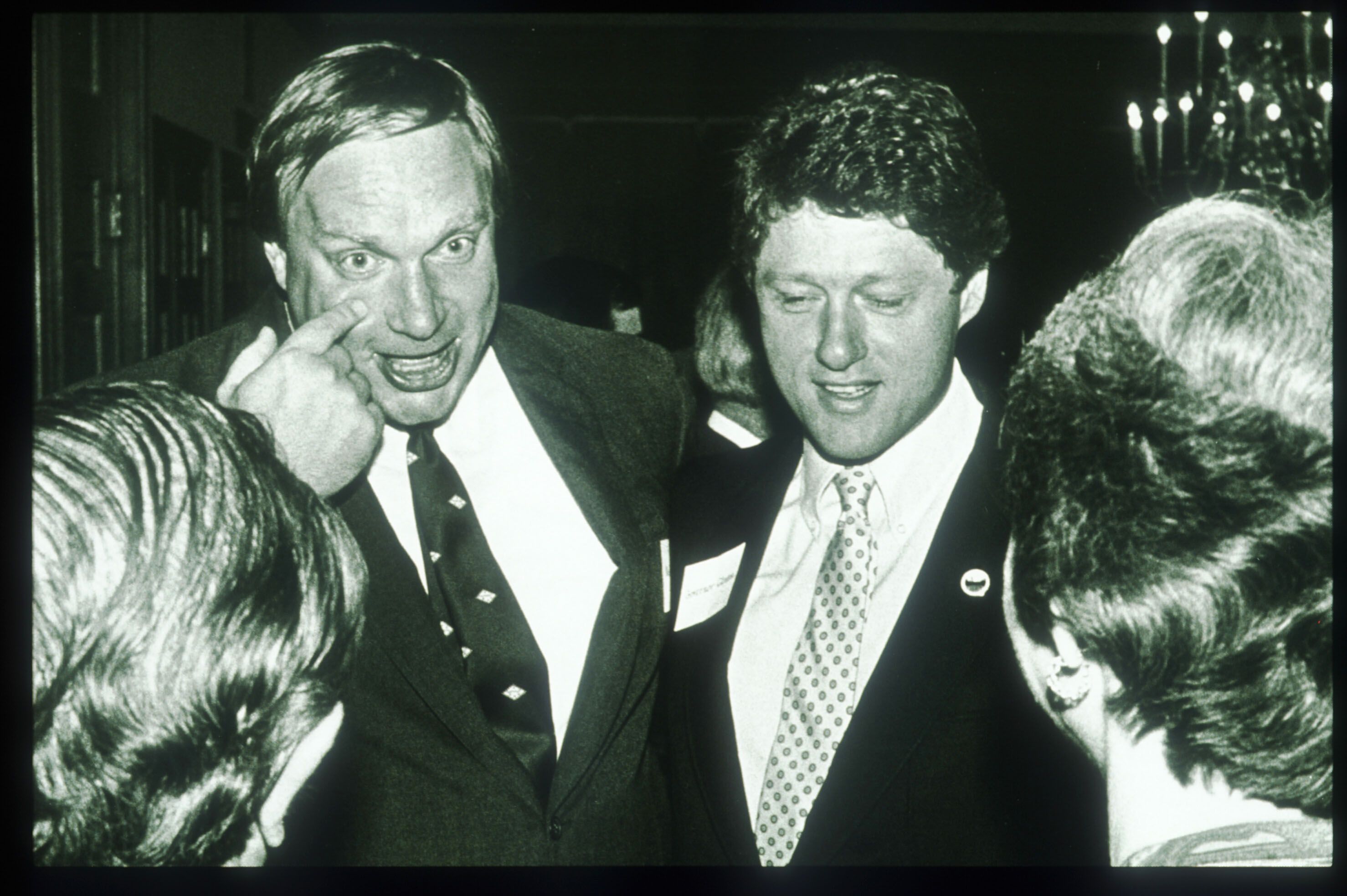Webster Hubbell: The Remarkable Story Of A Political Figure And Legal Trailblazer
Webster Hubbell is a name that resonates deeply within the corridors of American politics and legal history. As a former Associate Attorney General of the United States and a key figure during Bill Clinton's presidency, his story is both fascinating and complex. His life journey offers valuable insights into the inner workings of politics and the legal system in the United States. Understanding his contributions and controversies provides a comprehensive perspective on one of the most intriguing periods in American political history.
Hubbell's career trajectory from a small-town lawyer to a high-ranking official in the Department of Justice highlights the opportunities and challenges faced by legal professionals in the political arena. His tenure in public service and subsequent legal issues make his story an important case study for those interested in the intersection of law and politics.
This article delves into the life, career, and legacy of Webster Hubbell, exploring both his achievements and controversies. By examining his journey, we aim to provide a balanced and informative overview that sheds light on his impact on American jurisprudence and politics.
Read also:Tom Hanks Controversy A Comprehensive Exploration Of The Facts And Myths
Table of Contents
- Biography
- Early Life and Education
- Legal Career
- Political Ascension
- Controversies Surrounding Webster Hubbell
- Judicial Contributions
- Hubbell in the Media
- Impact on Politics and Legal System
- Legacy
- Conclusion
Biography
Early Life and Education
Webster Hubbell was born on September 25, 1941, in Hope, Arkansas. Growing up in a modest environment, he developed an early interest in public service and the law. Hubbell attended Ouachita Baptist University, where he earned a degree in political science before pursuing a law degree at the University of Arkansas School of Law.
His educational background laid the foundation for his future career in law and politics. During his time at university, Hubbell demonstrated a keen interest in public policy and legal reform, which would later shape his career path.
Below is a summary of his personal information:
| Full Name | Webster Hubbell |
|---|---|
| Birth Date | September 25, 1941 |
| Birth Place | Hope, Arkansas |
| Education | Ouachita Baptist University, University of Arkansas School of Law |
| Profession | Lawyer, Public Servant |
Legal Career
After graduating from law school, Webster Hubbell began his legal career in private practice. His expertise in corporate law and regulatory compliance quickly earned him a reputation as a skilled attorney. Over the years, he handled numerous high-profile cases, which contributed to his growing influence in the legal community.
His commitment to justice and fairness was evident in his approach to legal matters. Hubbell's ability to navigate complex legal issues made him a valuable asset to his clients and colleagues alike.
Key highlights of his legal career include:
Read also:Mastering Iot Device Ssh On Aws A Comprehensive Guide
- Establishing a successful private law practice in Arkansas.
- Building a network of legal professionals who admired his dedication and integrity.
- Gaining recognition for his expertise in corporate and regulatory law.
Political Ascension
Hubbell as Associate Attorney General
Webster Hubbell's political career began to take shape when he joined the administration of President Bill Clinton. In 1993, he was appointed as the Associate Attorney General of the United States, a position that placed him at the helm of several critical legal and policy initiatives.
During his tenure, Hubbell played a pivotal role in shaping the Department of Justice's agenda. He was instrumental in addressing issues such as healthcare fraud, environmental protection, and civil rights enforcement. His leadership skills and legal acumen were instrumental in driving these initiatives forward.
Some of his notable achievements in this role include:
- Overseeing the investigation and prosecution of healthcare fraud cases.
- Advancing environmental protection policies through legal enforcement.
- Championing civil rights causes and ensuring equal justice for all.
Controversies Surrounding Webster Hubbell
Despite his accomplishments, Webster Hubbell's career was not without controversy. He became embroiled in the Whitewater scandal, a major political investigation during the Clinton presidency. The scandal involved allegations of improper financial dealings and misuse of government resources.
Hubbell eventually pleaded guilty to charges related to the scandal and served time in federal prison. This period marked a significant setback in his career and reputation. However, it also highlighted the complexities and challenges faced by public officials in high-pressure environments.
Key points about the controversy include:
- His involvement in the Whitewater scandal and subsequent legal proceedings.
- The impact of the scandal on his personal and professional life.
- Lessons learned from the experience and its implications for future public servants.
Judicial Contributions
After his legal troubles, Webster Hubbell continued to contribute to the legal field in various capacities. He worked as a consultant and lecturer, sharing his insights and experiences with aspiring lawyers and legal professionals. His contributions to legal education and reform remain significant.
Hubbell's focus on ethical practices and transparency in the legal profession has influenced many in the field. His advocacy for accountability and integrity continues to inspire those who strive to uphold the principles of justice.
Hubbell in the Media
Media Coverage and Public Perception
Webster Hubbell's career and controversies have been extensively covered by the media. Newspaper articles, television interviews, and documentaries have explored various aspects of his life and work. Public perception of Hubbell has been shaped by these media portrayals, which often highlight both his achievements and shortcomings.
His story serves as a reminder of the importance of transparency and accountability in public service. Media coverage has played a crucial role in shaping public discourse around these issues.
Impact on Politics and Legal System
Webster Hubbell's influence extends beyond his personal career achievements. His experiences and contributions have had a lasting impact on American politics and the legal system. His work in promoting ethical practices and legal reform continues to resonate with policymakers and legal professionals today.
Key areas of impact include:
- Promoting transparency and accountability in government.
- Advancing legal reforms that address contemporary challenges.
- Influencing future generations of legal professionals and public servants.
Legacy
Webster Hubbell's legacy is a complex one, marked by both triumphs and challenges. His contributions to the legal and political landscape of the United States have left an indelible mark. Despite the controversies that overshadowed his career, his dedication to justice and public service remains an inspiration to many.
As we reflect on his life and work, it is important to recognize the lessons that can be drawn from his experiences. His story serves as a reminder of the importance of integrity, accountability, and perseverance in the pursuit of justice.
Conclusion
In conclusion, Webster Hubbell's life and career offer valuable insights into the complexities of law and politics in the United States. From his early days as a small-town lawyer to his role as Associate Attorney General, his journey has been marked by both achievements and controversies.
By examining his contributions and challenges, we gain a deeper understanding of the dynamics at play in the legal and political arenas. We invite you to share your thoughts and reflections in the comments section below. Additionally, explore other articles on our site for more in-depth coverage of similar topics.
References:
- U.S. Department of Justice - Official Website
- The Whitewater Investigation: A Comprehensive Overview
- Legal Ethics and Accountability: Lessons from Webster Hubbell

